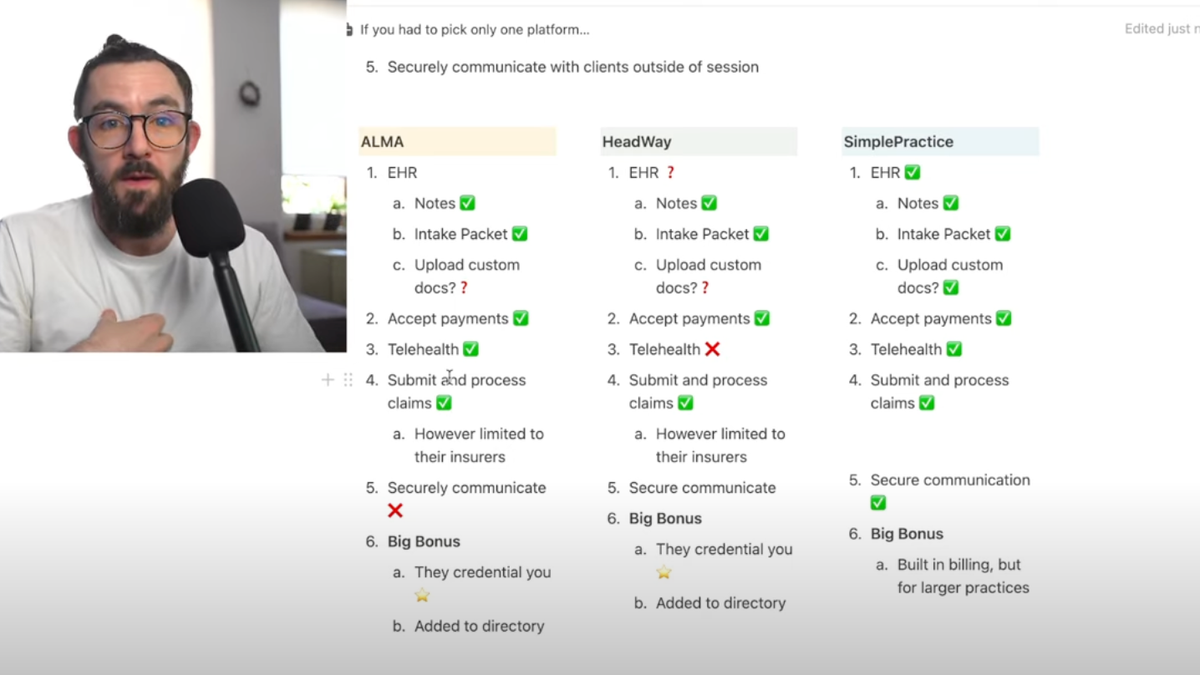
Therapist Reviews: Alma vs. Headway vs. SimplePractice
This video is not sponsored. It is made based on my own experiences. All videos are provided for informational purposes only and do not constitute clinical or legal advice.
VIDEO TRANSCRIPT:
If you had to choose one platform to run your private practice, which one would you choose?
If you had to pick one platform for your private practice, what would you pick?
I get asked this quite a bit, and that's because there are so many platforms out there. It just seems like there's a new one every week, right?
We've got Alma, we've got Headway, we've got SimplePractice, we've got Grow — I mean, there's just so many.
Each one seems to be doing just slightly better at one thing than the other. This one's good at billing, this one's good at credentialing, this one's good at EHR stuff, and then before you know it, we're all signed up for all these platforms.
We're spending most of our time trying to sync the platforms together or bouncing back and forth, and none of us have time for that, nor do we want to be doing that.
Actually, in this video, I'm going to go through three of the bigger platforms that I'm asked about and that I talk about, and three platforms I actually have experience with: Alma, Headway, and SimplePractice.
By the end of the video, I'm going to share with you what I would choose, and hopefully, you'll have a better idea of what you might want to choose as well.
Now, before we jump in, if you haven't been here before, my name is Matt. I'm a therapist in private practice. I like to make videos just like this to help other people start, run, and grow their own private practices.
I also host a consultation Community, and that is for people who would like to hear from me directly.
Maybe you have questions that aren't answered in this video, or you have other questions that you'd like to ask. You can consider joining that Community. That's where I respond to every single question personally. There's a link to that down below in the [video] description.
Now, without further ado, let's jump into this video here and this topic.
I have to share that the reason why there are so many different platforms is each one seems to be trying to fix a problem.
Okay, so for example, when Alma and Headway first came out, they're trying to fix the problem of the difficulty in getting credentialed with insurance companies.
So they were able to fix that problem. Alma and Headway can help therapists get credentialed easily.
Now, along the way, some of these platforms then try to do more things.
Alma and Headway are trying to develop an EHR, right? So the thing about these platforms is they're not stagnant. They don't come out — like, Alma didn't just stick with credentialing. Now they're going into the EHR space.
SimplePractice started as an EHR, now they're doing some billing for people. So what we're seeing here is all these different companies trying to fix problems, but then they're trying to expand.
It seems like all of them are trying to become like the one-stop shop, but no one has quite figured out how to be the one and only platform a therapist needs.
We are getting kind of close though, and that's what we're going to talk about.
But that just answers the bigger question of like, why are there so many platforms? Why am I signed up for ten different things? It's probably because each one does something slightly better than the other.
Now the first thing we have to kind of address is, well, what exactly do we need?
Now this is not a one-and-one checklist. If you want a good checklist and you want to see me walk you through that entire thing, I have a video that walks you through the entire startup checklist for private practices.
But when I'm looking for a private practice solution, why don't we call it that? Something that can meet all the needs of the practice in one platform.
I'm going to look for a place for documentation.
So I need something that's going to take the place of an EMR, electronic medical record.
The most common things we're going to need that EMR to do: a place to store our clinical notes, intakes, treatment plans, discharge plans, right, that kind of thing.
I'm going to want to have my intake packet in there so I'm going to want to be able to send my clients, my potential clients, their intake packet so they can sign it, review it. Preferably, I would like that intake packet to be customizable.
I'd like to be able to send my own documents to clients, whether it be not only the intake packet but maybe I have a couple screeners for them to do, maybe I want to send homework. But I'd really like to be able to send clients a packet of information.
I would also like a place where I can store documents from clients, right?
So maybe they send me homework in return, maybe they're uploading medical records, whatever the case may be.
I'd really like the platform just to be able to store and contain all of the information, clinical information that I need from clients.
Okay, now there's more about that we can jump into, but at the basics, that's what we're looking for.
You would need this platform to also accept payments, right?
So you'd have to be able to charge credit cards. And so I mean, that's no matter whether you're cash pay or whether you're taking insurance as well, right?
So if you're taking insurance, you need to charge the co-pay, you need to charge the co-insurance, whatever it might be. And if you're cash pay, obviously you're charging for the session.
I would like to have a telehealth platform built-in as well.
So whether that be Zoom, whether that be just a built-in audio video platform — most of us are at least doing some virtual work, if not all.
So I would like a telehealth platform built in.
I would like to be able to submit and process claims as well for insurance, right?
If you're cash pay you don't really need to worry about that. But at some point people do change their mind, so I would like that ability to submit claims, process claims, all within that platform.
When I say submit, there's paperwork you need to submit to the insurance company to show that you've had the visit and all the proper coding needs to be on there.
And then processing claims — so when that claim gets verified and approved by the insurance company, there's payments associated with it and co-insurance.
I would want all that information to come back into the EHR, just to kind of have all that data accurate and in the note-taking software for me so I can see it and keep it organized.
And then finally, I would really like to have a secure communication place.
Or, you know, an element where I can communicate with a client securely, HIPAA compliant.
I would really like that built into the platform as well, because as clinicians, some of us are required to actually have a HIPAA compliant means of communication.
Alright, so I really like that. So this is kind of what I would look for in an all-in-one platform.
Now let's compare three of the major platforms out there now that you've probably heard about or you've been marketed from.
I've done a little bit of a comparison here — now it does require a bit of explanation.
So we're going to go through it, but I've taken the requirements up above that I would look for and I've applied them down below. So let's just go through, we'll kind of go across.

The first thing, and it's arguably the most important, is to have an EHR function, a documentation function.
Now you're going to notice Alma, Headway, and SimplePractice all do have some degree of an EHR built out.
I recently made a video about Alma's EHR. I actually reacted to the video that they put out.
Theirs has gotten to a place that I think it's pretty good — there's treatment plans, there's notes, there's templates.
As far as I'm concerned, I think someone could use an Alma EHR and be totally fine with it. It has almost everything you would need, so that's really good.
I do though have a question. I don't know, and the thing about these things is they're always changing, they're always updating things. But at this time, it does not look like you can upload custom documents into Alma.
Meaning, I don't think you could upload a homework assignment and send it to a client. And vice versa, I don't think a client can upload a homework assignment to you.
I do know that you can send an intake packet to the client, and I know a client can sign their intake packet and send it back to you in Alma. So that's first off, that's really like the — you need that, okay?
The custom thing we could live without it, but it's nice to have. And then again, there are note features all there.
Headway does have some semblance of an EHR. I don't love the way it's laid out. I've never used it, but I've looked at it. I don't love the way it's laid out. I'm not sure you can download information from it. I know there's a place for notes and there seems to be a place for treatment plans.
I also know you can send an intake packet but it's kind of janky and bit bare bones. It's not well laid out.
So I actually wouldn't recommend storing patient data, like I wouldn't recommend using Headway as an EHR at the moment.
But it — again, you can take notes, you can make it work. I wouldn't recommend it as it stands today. That's why I put the question mark there.
And then SimplePractice, this comes as no surprise, started their whole journey as an EHR. They're great as an EHR. You can take notes, intake packet, everything's customizable all around, just a good EHR.
Okay, so that checks all the boxes there.
Accept payments
All three of them can do it. There's really no difference here.
Of course, there's going to be small differences in the percentage that they take out, but at the end of the day, each of these platforms you can accept payments whether you're cash pay or insurance. They all have the ability to do that.
Telehealth platform
So Alma, still as of now, I'm recording this video end of April 2024, they are.
They give a Zoom account to people, okay? Excuse me, so they'll sign you up for a HIPAA compliant Zoom account. So that's really great.
Headway, there is — you provide your own, so they don't provide that.
And then SimplePractice actually has their own telehealth software. It's integrated into the EHR. I really like it, it's called TeleHealth. You click one button in the EHR and it launches their platform, so totally integrated, easy for the therapist, easy for the clients.
I really have no issues, so that's great, okay?
Submitting and processing claims
You'll notice they all do have a check mark here, but there are some caveats as well that we need to go through.
So in Alma and Headway, it's equally as easy to submit and process claims. It requires a few clicks of a button, they've built into their own platforms this ability to submit claims very easily.
However, and this is a huge however, you're limited to submitting claims — I tried to bold that, which I couldn't — you're limited to submitting claims for the insurance companies that they panel you with, okay?
So you cannot — let me say that again — they work with a couple of insurance companies, and if you're paneled with an insurance company outside of Alma or Headway, you cannot use Alma or Headway to submit claims, okay?
Only for the insurances that [Alma and Headway] panel you with, and we're going to talk more about that in a second.
And then again, [they] are going to be pretty much the same there.
And then we have SimplePractice, which you can submit and process claims. It's a little more complicated to get set up, and that's because you have to be paneled on your own.
We're going to get to this in step six, but I'll jump ahead a little bit. Alma and Headway, when they first started, were addressing the problem of how hard it was to get paneled with insurance companies.
So they actually made it very easy for a therapist to be paneled, and that's one of their biggest draws. If you sign up with Alma or Headway, they will panel you with insurance, like major insurance companies, alright?
So once you sign up for their platform, they're going to do all the heavy lifting of being paneled for you.
And really, all you need to do at that point is learn how to submit claims in their platform, right?
But SimplePractice does not panel you at all, so you have to do it on your own. If you want to know how to do it, I have a video about that. I'll leave that down below too. So that's a big hurdle right there.
So that's what makes some of these platforms not perfectly comparable, because Alma and Headway started as platforms to help with credentialing.
SimplePractice started as an EHR, but they're all kind of dipping their toes into this whole idea of being a practice management solution, okay?
So that being said, going back to SimplePractice, yes, you can submit and process claims for any insurer that you're paneled with.
But you have to be paneled on your own, and it's not that hard to get set up, but it's a little bit more, a little bit more detailed than Alma or Headway.
Secure communication
Oh, actually I need to fix this, let's see. That is incorrect.
Headway actually does, let's pretend there's a check mark there. I can't get it to pop up right now. Yeah, not popping up.
Alma does not have a way to message clients, okay, built into their platform. So you obviously have to provide either your own HIPAA compliant email, your own messaging platform.
Headway does, I'm sorry I can't get the check mark to work, but Headway does actually provide a messaging platform, which is interesting. And SimplePractice does as well, okay?
Now this is one, not a huge deal, because most of us can access HIPAA compliant emails fairly easily. And you can even actually have clients sign a consent, you know, to use an email that's not HIPAA compliant if you want to do that.
Bonus Section: Credentialing
And then finally, we're going to get to this section six here, which is this big bonus section [on credentialing] that I have written down.
Alma and Headway are going to be the same here as well, and it's that they credential you with insurance companies.
This is huge — being credentialed can help you build a caseload, it provides more access to care for people, and it's typically fairly difficult and/or costly and/or just time-consuming for you to do it on your own, not impossible, but you know, it costs you time at the very least.
They're going to do it for you very easily, okay?
And that's huge. So once you work with them, you're going to be credentialed with some major insurers. And then I also added that they'll put you on their directory, and that's nice, it's nice to be listed on a directory.
And now SimplePractice, the issue here is that they do not credential you. And this is why many people, myself included, have worked with Alma and/or Headway and an EHR.
And that's because before, you know, actually a couple months ago, like Alma and Headway, you know, their EHRs weren't all that built out.
I was always recommending, you know, both Alma and Headway for getting paneled and SimplePractice for the EHR, but that's starting to change a little bit.
But SimplePractice does not credential you, okay?
But they did unveil a little while back, actually, a built-in billing tool. And now this is going to only be for group practices and people who have like substantial income per month because they have this pretty high minimum requirement.
But if you do meet that as a group practice, SimplePractice will actually be your biller. So that is something that's kind of cool. But yeah, so this is kind of the rundown now.
It might not be obvious from this graph here, there are a lot of greens.
But if I — like today, end of April 2024 — had to choose only one platform to start my private practice, I would probably start with Alma.
And that is mainly because they have really done a nice job of building out their EHR to a place that I think is acceptable, okay?
And when I say acceptable, I don't mean just to me, but I mean like to uphold clinical standards.
Can you download the information if you got audited, would it work out, you know, that kind of thing? You can accept payments, they got telehealth, you can submit and process claims with the insurers you're paneled with, and you're paneled.
The only thing you're going to need to provide is a HIPAA compliant email, and who knows, they might change this in the near future. And then you know, a couple of the things that they're missing but aren't crucial — are kind of the custom documents and things like that.
But if I had to start today, and if I was recommending it to you watching this — and it's you know 2024 and not much has changed — Alma would be a great place to start, okay?
I know this video is a little bit long. I hope you learned something from it, I hope it gives you more information about how to make a decision. Anyway, I hope you have a great rest of your day and I will see you in the next video.
Apr 26, 2024

Looking for a therapist?
Get tips on finding a therapist who gets you.
By submitting this form, you are agreeing to Alma's privacy policy.



